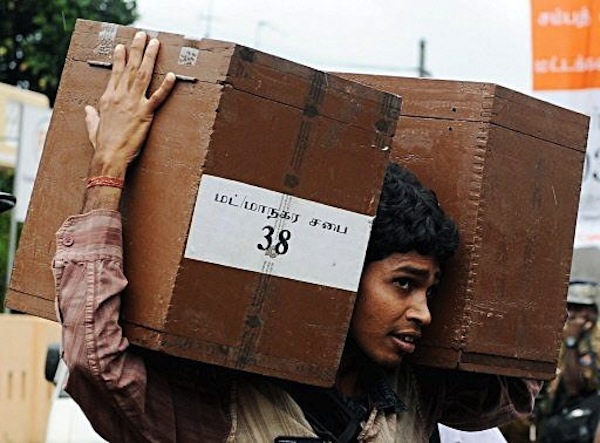Image from AsiaNews.it
The focus of my article in the Sunday Leader of 5 May was on the need for Northern Provincial representation. It now looks as if those elections may be held in September 2013. I will elaborate on the likely consequences of representation, or the lack of it, drawing on past experience in Sri Lanka, India and the USA.
All over Sri Lanka the bulk of the Muslim population are Tamil speakers. It was so almost 100% at every socio- economic level when the Official Language Act was enacted in 1956. But at that time the political leader ship of the Muslims were mostly Members of Parliament representing Sinhalese majority electorates. All these voted for Sinhala only, as desired by their mostly Sinhalese voters, even though they were themselves Tamil speaking. The Muslim MP’s representing Eastern Province electorates voted against the Bill, as desired by their voters, nearly all of them Tamil speaking. In the Senate, AMA Azeez, who was not elected by Sinhalese voters, not only opposed the Bill but quit his party on this issue. One of the objectives in forming the SLMC, much later, under the leadership of Ashroff, based in the Eastern Province, was to ensure the election of Muslim MPs responsive to the wishes of the Muslim population.
In India, the Dalits / Harijan /Untouchables and Tribals have enjoyed quota reservations in political bodies and public institutions at all levels for close to a century. The practice had been that the reserved seats had been rotated from election to election with only Dalits standing for elections in the seats reserved for them. In the 1930s, about the same time as the Donoughmore Commission in Sri Lanka, a dispute arose between the Dalit leader Dr.B.Ambedkar and Mahatma Gandhi as to whether electorates should hitherto be purely territorial or whether Dalits should have separate electoral registers. Gandhi wanted the former, and Ambedkar the latter, but there was no dispute regarding the need for reservations. Under Gandhi’s proposal even in electorates for Dalits, the majority of the voters would be non- Dalits. Dr.Ambedkar argued that the Dalit candidates would then tailor their manifestos to suit the majority non- Dalit voters. In fact Dalit candidates seeking High Caste Hindu votes would often stand respectfully outside the house, declining any invitation to enter the house or to sit on a chair or to accept a cup of tea. Such practices helped to win High Caste votes. Dr.Ambedkar wanted Dalit candidate to adopt radical manifestos for 100% Dalit electorates. The British Colonial Government suspended progress towards independence till this issue was solved. Gandhi started a fast to death and was close to death when Ambedkar caved in, and agreed to purely territorial electorates with both Dalit and Non-Dalit voters in exchange for increased quotas for Dalits. It is this compromise that was embodied in the Indian Constitution drafted two decades later under the Chairmanship of Dr.Ambedkar.
In the USA, Governor Wallace of Alabama, perhaps the most racist of the Southern leaders, had Presidential ambitions. His state was Black majority but he had ensured that, as in most Southern states, most of the Blacks were denied voting rights on some pretext or the other, such as illiteracy. The Whites all over the South were fearful of being swamped by Blacks if they gained voting rights. His 1962 campaign slogan was, “From the cradle of the Confederacy, this very heart of the great Anglo- Saxon Southland … Segregation now! Segregation tomorrow! Segregation forever! He bitterly and violently opposed the Voting Rights Act, but when he found that he could not stop it, he did a U-turn on many issues. He there after supported many Black causes because his vote base was now more Black than White, though he remained as racist as ever.
Hopefully the NPC elections will not only bring about changes in the administration of the Northern Province, but also compel Colombo to take into account the NPC leadership, which may be why these elections have been long delayed. The elections and their likely outcome will surely have a positive impact on the politics of Colombo and also on National Reconciliation.

